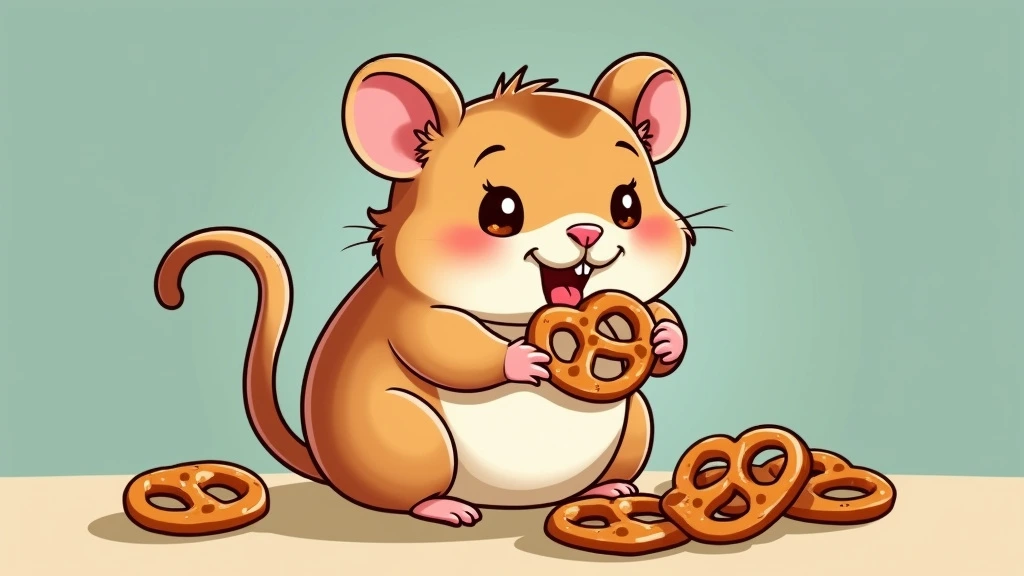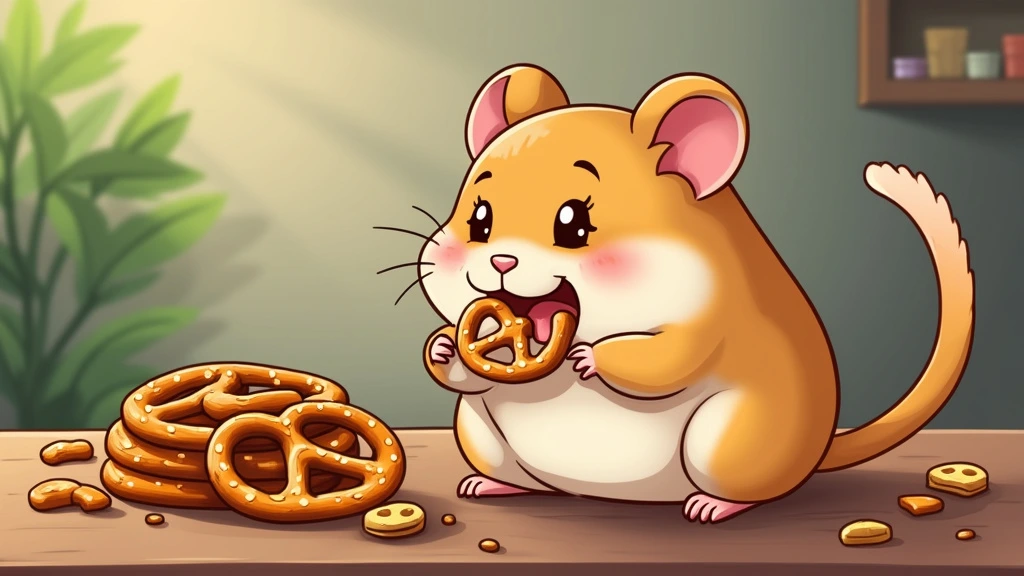As a hamster owner, you’ve probably wondered about the safety of various treats for your furry friend. One common question that arises is, “Can hamsters eat pretzels?” This comprehensive guide will explore the world of hamster nutrition, focusing on the suitability of pretzels as a snack for these adorable rodents.
Understanding Hamster Nutrition
Before we dive into the specifics of pretzels, it’s crucial to understand the basics of hamster nutrition. Hamsters are omnivores, meaning they can eat both plant-based and animal-based foods. In the wild, their diet consists mainly of seeds, grains, and occasional insects.
A healthy hamster diet should include:
- High-quality commercial hamster food (70-80% of their diet)
- Fresh vegetables (15-20%)
- Small amounts of fruits and proteins (5-10%)
Treats should make up no more than 10% of a hamster’s daily food intake. This balance ensures they receive all the necessary nutrients without overindulging in less healthy options.
The Hamster Digestive System
Hamsters have a unique digestive system that’s adapted to process a variety of foods. However, their small size means they’re sensitive to dietary changes and excess nutrients. Their digestive tract is designed to extract maximum nutrition from small amounts of food, which is why portion control is crucial when it comes to treats.
Are Pretzels Safe for Hamsters?

Now, let’s address the main question: can hamsters eat pretzels? The short answer is that while pretzels aren’t toxic to hamsters, they’re not an ideal treat option. Here’s why:
Nutritional Value of Pretzels
Pretzels are primarily made from refined flour, salt, and sometimes oil. They offer little nutritional value to hamsters and are high in carbohydrates and sodium. While carbohydrates are an essential part of a hamster’s diet, they should come from more nutritious sources like whole grains and vegetables.
Salt Content in Pretzels
One of the biggest concerns with feeding pretzels to hamsters is their high salt content. Hamsters have a low sodium requirement, and excessive salt intake can lead to health problems such as dehydration and kidney issues. The salt in pretzels can quickly exceed a hamster’s daily sodium needs.
Carbohydrates in Hamster Diets
While hamsters do need carbohydrates for energy, the type found in pretzels (simple carbs from refined flour) can lead to rapid blood sugar spikes. This isn’t ideal for hamsters and can contribute to obesity and other health issues if consumed regularly.
Potential Risks of Feeding Pretzels to Hamsters
Feeding pretzels to your hamster isn’t recommended due to several potential risks:
- Sodium Overload: As mentioned earlier, the high salt content in pretzels can be harmful to hamsters. Excess sodium can lead to increased thirst, dehydration, and in severe cases, kidney problems.
- Obesity: Pretzels are calorie-dense but nutrient-poor. Regular consumption can contribute to weight gain and obesity in hamsters, which can lead to various health issues.
- Dental Problems: The hard texture of pretzels might seem good for a hamster’s teeth, but the refined flour can actually stick to their teeth, potentially leading to dental decay.
- Choking Hazard: Depending on the size and shape of the pretzel, it could pose a choking risk for your small pet.
- Digestive Issues: The low fiber content and simple carbohydrates in pretzels can potentially disrupt a hamster’s digestive system, leading to constipation or diarrhea.
Healthy Alternatives to Pretzels for Hamsters
Instead of pretzels, consider offering your hamster these healthier treat options:
- Fresh Vegetables: Small pieces of cucumber, carrot, or broccoli make excellent, low-calorie treats.
- Fruits in Moderation: Tiny amounts of apple (without seeds), banana, or berries can be occasional treats.
- Lean Proteins: Small bits of boiled egg white or unseasoned, cooked chicken can provide beneficial protein.
- Commercial Hamster Treats: Look for specially formulated hamster treats that are nutritionally balanced.
- DIY Hamster Snacks: Create homemade treats using hamster-safe ingredients like oats, unsweetened whole grain cereals, and small seeds.
Guidelines for Treating Your Hamster
When offering treats to your hamster, follow these guidelines:
- Portion Control: Treats should make up no more than 10% of your hamster’s daily food intake.
- Frequency: Limit treats to 2-3 times per week to prevent overfeeding.
- Variety: Offer a range of different healthy treats to provide diverse nutrients and prevent boredom.
- Observation: Always monitor your hamster after introducing a new treat to ensure they don’t have any adverse reactions.
- Freshness: Remove any uneaten fresh treats after a few hours to prevent spoilage.
Making Informed Choices for Your Hamster’s Diet
In conclusion, while hamsters eating pretzels isn’t likely to cause immediate harm, it’s not a recommended treat due to its high salt content, simple carbohydrates, and low nutritional value. As a responsible pet owner, it’s crucial to prioritize your hamster’s health by offering nutritious, species-appropriate treats in moderation.
Remember, a varied diet based primarily on high-quality hamster food, supplemented with fresh vegetables and occasional healthy treats, is the best way to keep your hamster happy and healthy. By making informed choices about your hamster’s diet, you’re contributing to their overall well-being and potentially extending their lifespan.
FAQs About Hamsters and Pretzels
Q: Can hamsters eat flavored pretzels? A: Flavored pretzels are even less suitable for hamsters than plain ones. They often contain additional salt, sugar, or artificial flavors that can be harmful to your pet.
Q: How much salt is too much for a hamster? A: Hamsters need very little sodium in their diet. Even a small pretzel can exceed their daily salt requirement. It’s best to avoid salty treats altogether.
Q: What should I do if my hamster eats too many pretzels? A: If your hamster has consumed a large amount of pretzels, monitor them closely for signs of increased thirst, lethargy, or digestive issues. Provide plenty of fresh water and contact a veterinarian if you notice any concerning symptoms.
By following these guidelines and choosing appropriate treats, you’ll ensure your hamster remains healthy, happy, and well-nourished throughout its life.

